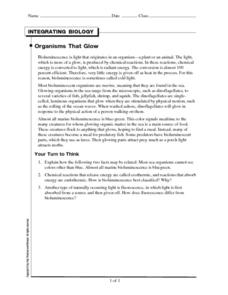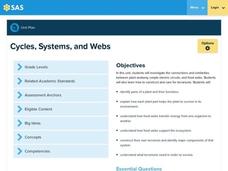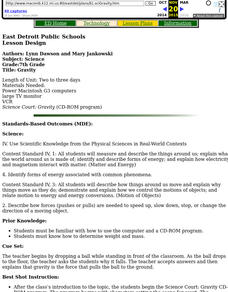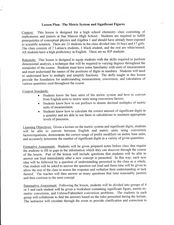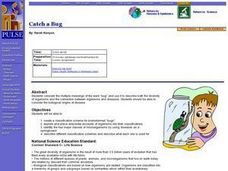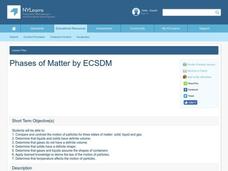Curated OER
Organisms that Glow
In this bioluminescence worksheet, students read about various organisms that glow on land and in the sea. They answer three critical thinking questions after reading about these chemical reactions.
Curated OER
Genetics and Heredity: The Next Generation
Tenth graders work in teams to order events of DNA transcription and translation protein synthesis. In the second lesson, they put the steps of mitosis and meiosis in order using a concept map poster. They use modeling clay to create...
Curated OER
Magic School Bus: The Wild Whale Watch Lesson Plan
Students research information about whales. In this early childhood lesson plan, students create an illustration of a whale to display in a sea scene in the classroom. Students then use the library and internet to research a whale of...
Curated OER
The Magic School Bus Plays Ball
Students learn along with Ms. Frizzle's class. In this Magic School Bus lesson plan, students work in small groups to find how movement changes when there is more - and less - friction.
Curated OER
Atomic Structure
In this atomic structure instructional activity, students draw a helium atom and show the subatomic particles. They also answer questions about the Bohr model, Dalton's atomic theory and the energy of electrons based on their location in...
Curated OER
The Chemistry of Art
In this chemistry of art worksheet, learners read about the chemical reactions that turn art made of different metals colors. They answer three questions about the chemical reactions related to metals and art.
Curated OER
Integrating Biology-Muscles and Work
In this muscle and work worksheet, students read about aerobic, anaerobic and resistance exercise. They apply what they read and answer three questions about these three types of exercise.
Curated OER
The Tropopause
In this tropopause worksheet, students read about the temperature of the air in the tropopause or the layer of the atmosphere closest to the Earth. They answer four critical thinking questions about this layer and the energy changes that...
Curated OER
Building a Terrarium System
Learners create their own terrariums. In this ecological model lesson, students create terrariums using soil, seeds, pebbles, and two liter bottles. Learners compare the elements of a terrarium to a food web.
Curated OER
Gettysburg Rocks Recycle to Win
Eighth graders use a geologic cross section to study the rock cycle of the Gettysburg battlefield. In this rock cycle lesson, 8th graders connect the rock cycle and continental rifting.
Pennsylvania Department of Education
Cycles, Systems, and Webs
Fourth graders review the parts of the plant and their functions. In this plant lesson plan, 4th graders recognize that plants must transfer energy to make food. Students understand the interdependence of organisms in an ecosystem.
Pennsylvania Department of Education
The Digestive System
Fourth graders simulate how the digestive system works. In this hands-on simulation, 4th graders complete six group activities that help students visualize how our body breaks down food into nutrients.
Curated OER
Section 4.2: Ionic and Covalent Bonding
There are only six short answer questions on this assignment. Chemists explain electrical conduction properties of salt, salt water, and gold. They compare ionic and covalent bonds. The explain bond strengths. Perhaps you could use this...
Curated OER
The Circulatory System - Part I
First graders consider what effect their behavior has on their health. Students make a fist to indicate the size of his/her heart. They complete a worksheet on the heart, coloring the arteries red and the veins blue.
Curated OER
Measurement of the Depth of the Ocean
Students comprehend the physical properties of pressure and Boyle's Law by designing a depth gauge. They construct a capillary depth gauge and calculate the calibrated depth marks of the capillary tube. They determine the margin of error...
Curated OER
Pendulum Lab
Students predict how changing the pendulum components affect its period. In this physics lesson, students calculate the period using different masses. They analyze lab result and complete assigned worksheet.
Curated OER
Termite Biology
Students explore the physical characteristics, distribution and habitat of termites. The lesson focuses on the termite as a social creature contrary to most other insects.
Curated OER
Global Warming – More or Less
Eighth graders identify the factors that contribute to global warming. In this earth science lesson, 8th graders evaluate the impact of global warming on the planet. They discuss their views within the group.
Curated OER
Gravity
Seventh graders progress through the Science Court: Gravity CD-ROM program. They read about and discuss how gravity was discovered. They complete review worksheets in preparation for the test.
Curated OER
The Metric System and Significant Figures
Students compare and contrast the English and Metric system. In this chemistry activity, students demonstrate how to convert English to metric and vise versa. They solve problems following the rules of significant figures.
Curated OER
Arsenic and Human Health
Ninth graders concentrate on arsenic poisoning as an example of the connections among health, geography, and geology as they develop a persuasive presentation about the dangers of arsenic in the drinking water, targeting a specific...
Curated OER
To Float or Not to Float - A Lesson on Density
Pupils define density in their own words. In this physics lesson, students calculate density using mass and volume. They explain why some objects sink and some float.
Curated OER
Levers - An Interactive Lesson
Seventh graders identify the different parts of a lever. In this physics lesson, 7th graders draw a lever and label the different parts. They use the interactive board to create their own lever.
Curated OER
Phases of Matter
Students describe the motion of solids, liquids and gases. In this chemistry lesson, students describe how temperature affect motion of the particles. They determine the physical properties of each phase.


